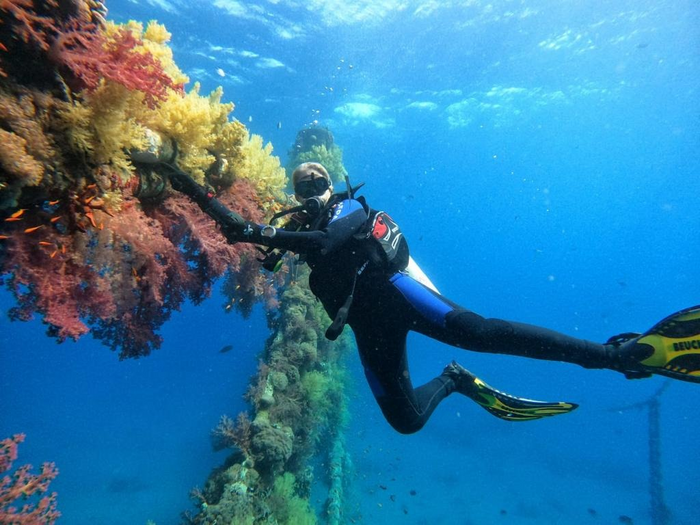Reviewed by Alex SmithNov 30 2022
At Tel Aviv University and the Interuniversity Institute for Marine Sciences in Eilat, a new study analyzed the larvae development of corals and plastic additives on the reproductive process and other organisms discovered in Eilat’s coral reef.
 Noa Shenkar. Image Credit: Hadas Zion.
Noa Shenkar. Image Credit: Hadas Zion.
Plastic additives are known as chemicals that are added to plastic products during the time of manufacturing, and several of them are acknowledged to be endocrine-disrupting compounds. The present study performed displays that these chemicals can have species-specific effects that might cause harm to the biodiversity of coral reefs and the population structure.
The study was headed by Ph.D. student Gal Vered of the Interuniversity Institute for Marine Sciences in Eilat and Tel Aviv University and Professor Noa Shenkar of Tel Aviv University’s School of Zoology in the Wise Faculty of Life Sciences and the Steinhardt Museum of Natural History.
The study was reported in the renowned journal Environmental Pollution.
The scientists concentrated on four organisms: a soft coral, a stony coral, a fire coral, and a solitary ascidian. Such organisms play an essential role in the ecology of tropical coral reefs and cause harm to their reproduction and development as it might impact the structure of the reef community.
Besides, the scientists analyzed four chemical additives extensively utilized in plastic products and have been discovered in seawater in tropical areas occupied by coral reefs.
Two of these were known to be phthalate chemicals, which are utilized to weaken and increase the resilience of various kinds of plastic and could be discovered in an extensive range of consumer products like medical devices, food packaging, adhesives, and toys.
The others were 4-nonylphenol, a stabilizer that has been utilized in plastic packaging and consists of an additive in bisphenol A, and cleaning agents found in polycarbonate plastic that is utilized for food and beverage packaging, boxes, baby bottles, and more.
The European Chemicals Agency has categorized bisphenol A as a substance that might cause harm to human fertility. This depends on proof discovered in laboratory animals.
Plastic additives are chemical additives that are incorporated into plastic products during the manufacturing process. These substances reach marine environments through plastic waste and wastewater. Some of them are known to activate or suppress hormonal processes, and can therefore disrupt biological systems.
Gal Vered, PhD Student, Interuniversity Institute for Marine Sciences, Tel Aviv University
Vered continued, “However, their effects on organisms in coral reefs have hardly been studied. The structure of the coral reef population depends on the success of the reproduction, development, and settlement of corals and other reef organisms.”
Interference with their hormonal systems may affect the chances of success of these processes, and an uneven effect on the different species may lead to a change in the community’s structure and damage to the entire system,” added Vered.
The scientists performed various exposure experiments in which the effects of the plastic additives were tested at eco-relevant concentrations in seawater and greater laboratory concentrations. The quantified parameters were larvae development, survival, fertilization, and larvae settlement and metamorphoses.
The eco-relevant concentration of 4-nonylphenol was discovered to curb larvae settlement in the soft coral. In contrast, a high concentration of a similar compound harmed the fertilization, development, and settlement of all the studied organisms.
The greater laboratory concentration of one of the studied phthalate chemicals harmed the settlement because of the stony coral larvae, not the other organisms’ reproductive products. Such outcomes add to the collecting proof that plastic pollution consists of a selective effect on various species.
Professor Shenkar stated, “Our findings demonstrate plastic additives’ negative and selective effects on the development and reproduction of coral reef organisms. The environmentally-relevant concentrations used in our experiments were concentrations found in seawater; alarmingly, some had deleterious effects on organisms’ reproduction.
Shenkar added, “Nevertheless, concentration within organisms’ tissues may reach higher levels as these compounds can potentially bioaccumulate. To better understand the impact of plastic additives on this endangered ecosystem, we suggest developing better methods for measuring the actual concentrations within the tissues of the organisms to produce relevant risk assessments.”
Climate change, ocean acidification, and ongoing anthropogenic stressors place coral reefs at existential risk. Most of the coral reefs in the world are found in developing countries where the human population is expanding rapidly and waste management is lacking.
Gal Vered, PhD Student, Interuniversity Institute for Marine Sciences, Tel Aviv University
Vered added, “Steps towards preventing plastic waste from reaching the environment include proper local waste management that reduces transportation of waste, and sustainable consumption of products regulated for additives.”
The researchers conclude, “We emphasize the importance of proper waste management that will reduce the presence of plastic waste from reaching the marine environment, as well as the need for methods to measure the concentration of chemicals inside the bodies of organisms, in order to assess the possible risk to their reproductive and developmental processes.”
Journal Reference:
Vared, G & Shenkar, N (2022) Limited effects of environmentally-relevant concentrations in seawater of dibutyl phthalate, dimethyl phthalate, bisphenol A, and 4-nonylphenol on the reproductive products of coral-reef organisms. Environmental Pollution. doi.org/10.1016/j.envpol.2022.120285.